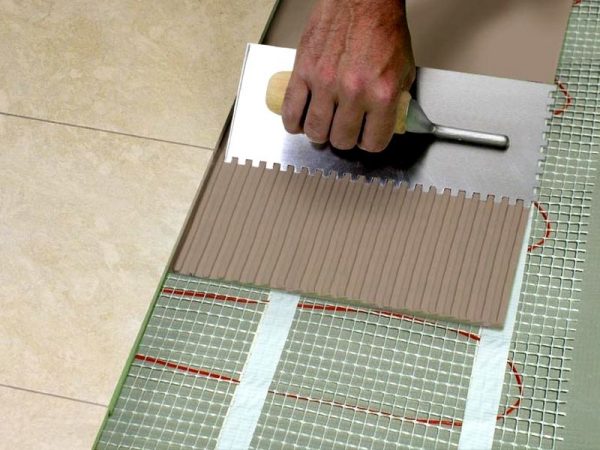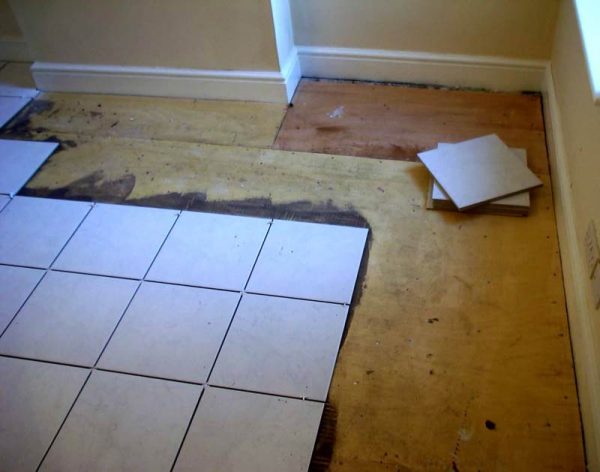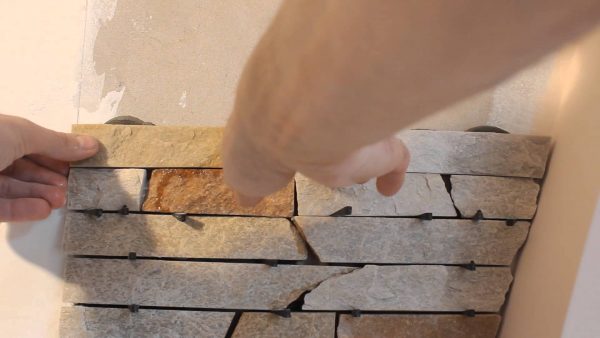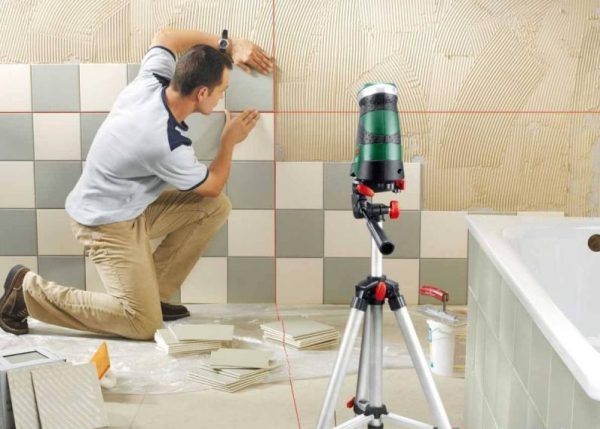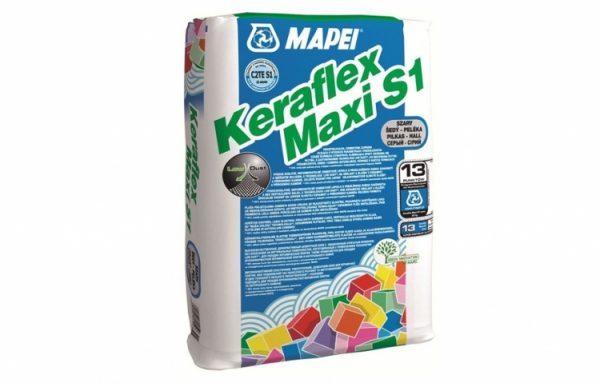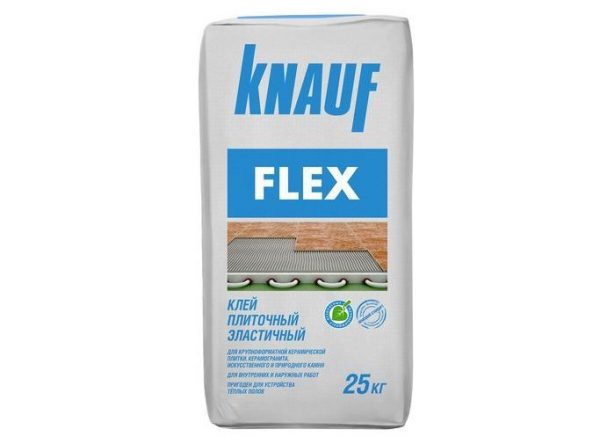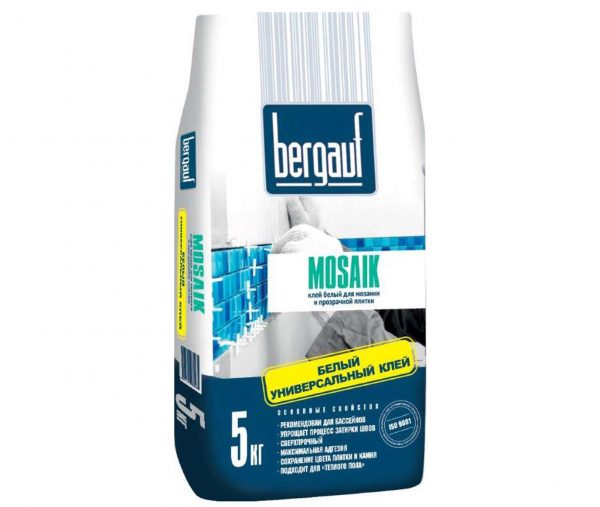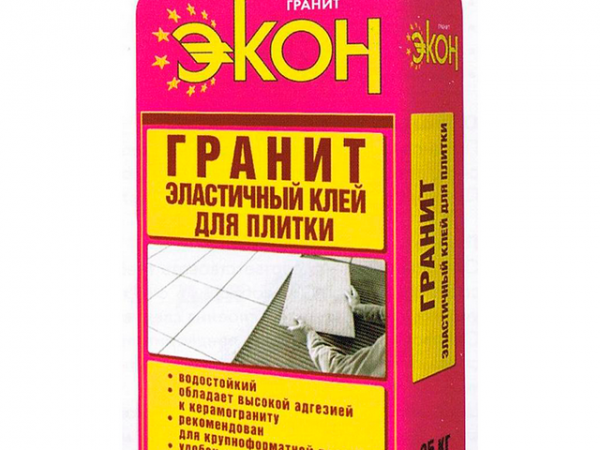Tile need to be glued with special compositions that provide reliable adhesion to the base. In stores, elastic glue for tiles is sold - a product enriched with special plastic additives, modifiers. Such glue is also suitable for other purposes: at a construction site, in repair and at home.
- Features of elastic glue
- Scope of plastic mixtures
- Consumer Adhesive
- Physical and mechanical properties
- Application restrictions
- Laying Principles
- Manufacturers Overview
- Litokol
- Mapei
- Ceresit
- Kiilto
- Knauf
- Ilmax
- Bergauf
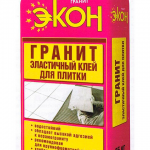
Features of elastic glue
The basis of all elastic adhesive mixtures is cement (white or Portland cement), although the additives to the composition can be very different: quartz sand, polymer components, rubber, minerals, plasticizers, epoxies. They are introduced to prevent cracking of the material for a long time, give increased elasticity.
Adhesives can be used for non-deformable, deformable substrates. Even under conditions of deformation, the adhesive layer will not collapse, which is associated with its elasticity.
to contents ↑Scope of plastic mixtures
Tile elastic adhesive is designed for facing movable and flexible substrates. You can use the product for gluing mosaics, tiles, porcelain tiles, clinker and acid-resistant tiles, on “problem” surfaces to which ordinary cement glue does not fit. We are talking about new houses, apartments, prone to shrinkage. If you lay the tiles on plain glue, cracks will appear after a while, or it will completely fall off.
Glue can be of two types: for decoration or facade work, that is, external and internal. It can be used for other purposes:
- gluing ceramics on a warm floor, screed;
- finishing of cement-bonded particleboards (DSP), chipboard;
- facing of drywall, aerated concrete;
- lining of glass, mosaic on plywood;
- facing of the old glazed tile.
to contents ↑Important! The glue is also suitable for foundations subject to high loads - pools, balconies, steps, stairs, bathrooms.
Consumer Adhesive
The main property of the material is plasticity, it is it that does not allow the base to be deformed when the tile moves during shrinkage. Must be a high rate of adhesion - from 1-1.5 MPa. If there is good elasticity, the composition will easily transfer:
- Vibration
- temperature differences;
- other types of deformations.
Glue for outdoor work is required to have frost resistance, moisture resistance, because they will have to glue objects subject to atmospheric factors. Any tool necessarily has good wear resistance, bending strength. The adhesive composition for internal work should be environmentally friendly, safe for people.
to contents ↑
Physical and mechanical properties
Externally, the elastic adhesive before dilution is a dry powder of gray or white color, depending on the base. Ready-made mixes are also on sale.The average technical characteristics of the adhesive:
- Flexural strength - from 3.5 MPA.
- The creep is 0.5 mm.
- Density - 1500 kg / sq.m.
- Transfer of temperature differences - up to 100 cycles.
- Consumption - 1.3-2 kg / sq.m.
Most adhesives are sold, like other building mixtures, in bags of 25 kg, 10-15 kg, in banks of 5-20 kg.
to contents ↑Application restrictions
Some products do not withstand heat, as the manufacturer always warns. They can not be used when installing a warm floor, on warming substrates, since the seams and joints quickly peel off.
It is not recommended to combine such glue only with marble, other types of natural stone. For all other materials, it can be safely used.
to contents ↑Important! Some products are not focused on bulky porcelain stoneware, so you need to look carefully at the markings.
Laying Principles
Any surface before laying the tiles must be prepared. It must be cleaned of dust, dirt, walk with a primer. The latter is necessarily completely dried, glue can not be applied on a wet surface (this reduces adhesion). Wooden bases from 3 centimeters thick should be laid on the logs, placing them quite often, screwing with screws.
The adhesive composition is applied to the floor with a notched trowel, evenly smoothed so that the layer in some areas is not too thick. Also, with a thin layer, glue the tile from the inside out with glue. The material is laid on the floor, well pressed. The joints are filled after the glue dries with a grout, after the remnants of the grout are removed. As the final drying, the tile is wiped with a wet rag. The floor can be operated after 24 hours.
to contents ↑Manufacturers Overview
There are undoubted leaders on the market, producing the most sought-after mixtures. You can also meet "young" brands that are no less high-quality.
Litokol
Professional adhesive of this manufacturer Litoflex K80 is used for laying porcelain stoneware, wall tiles. It can be used even in the technique of "tile to tile", for the arrangement of underfloor heating, plinths, facades. Mass consumption is very small due to high adhesion.
Mapei
These adhesives are quick drying - in just 12 hours the surface will be ready for use. They contain polyurethane components, giving the mass high ductility. Excellent adhesion is provided by isacyanate hardeners, special fillers. Using Mapei adhesives, you can glue tiles even on concrete, asphalt, reinforced polyester, gypsum, asbestos.
to contents ↑Ceresit
Ceresit brand produces several high-quality elastic adhesives. Cerezit CM17 25 kg (D) is very popular, it is appreciated by professionals and beginners. Due to sufficient adhesion, you can stick a new tile on an old, glossy one. The adhesive is moisture-resistant, frost-resistant, the presence of polyurethane allows it to withstand sudden temperature fluctuations. Ceresit R-710 is used for gluing tiles made of quartz-vinyl, a number of other unusual materials. Ceresit SM-11 is bought for finishing an uneven surface, the glue is very simple to use.
to contents ↑Kiilto
Kiilto PL 250 glue is produced in Russia, made on the basis of polyurethane. In addition to tiles, you can use it when installing insulation, polystyrene, PVC. It is permissible to work with the product even at low temperatures - up to +5 degrees.
Knauf
Knauf Flex glue is ideal for working with complex surfaces, floor and wall tiles of any kind and texture. The material is considered economical, inexpensive, and highly elastic.
to contents ↑Ilmax
The tool Ilmax 3130 is produced in Belarus, is in high demand because of the low price, high quality. Special additives allow you to stick tiles on the product even in the area of stoves, fireplaces, not to mention the usual, “cold” substrates.
Bergauf
Bergauf Mosaik is recommended for working with the most capricious materials, including a variety of mosaics, transparent tiles. It is ideally white in color, perfect for wet rooms, not afraid of even direct contact with water (after solidification).
It’s easy to work with elastic adhesives, even a beginner can handle it. They should not be applied on a wet surface, this will lead to the rise of capillary moisture and spoil the masonry. Observing the technology, you can do the job efficiently, it will last for many years.

